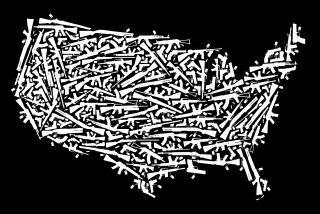CIA’s Purchase of Smuggled Arms From North Aides Probed by Panels
- Share via
WASHINGTON — Independent counsel Lawrence E. Walsh and a Senate committee are investigating the CIA’s purchase last fall of $1.2 million in smuggled weapons from Lt. Col. Oliver L. North’s two top aides in the Iran- contra affair, U.S. and European sources said Monday.
Working separately, the two offices are questioning whether the CIA made the unusual purchase last September as a financial reward for former Air Force Maj. Gen. Richard V. Secord and California businessman Albert A. Hakim, North’s key associates in the secret Iran arms sales.
They are also seeking to learn whether North or his White House boss, former National Security Adviser John M. Poindexter, steered the CIA to the arms deal, the sources said.
New Evidence Possible
Officials reportedly believe that the little-noticed weapons sale could yield new evidence of the financial and personal ties linking the CIA, North and his army of private operatives in the Iran-contra scandal.
Last September, White House computer records show, Poindexter ordered North to pressure then-CIA Director William J. Casey “to make things right for Secord,” apparently by awarding Secord a contract to sell or transport arms in return for his supporting role in the Iran-contra operation.
A month later, a Danish freighter chartered by Secord and Hakim unloaded most of a 358-ton cache of Polish AK-47 rifles and Portuguese mines and ammunition at the Pentagon’s munitions depot in Sunny Point, N.C. The arms cargo was reported to the U.S. Customs Service as oil drilling equipment, according to customs records released last month.
CIA officials admit privately that the agency purchased the weapons but contend that the CIA did nothing wrong. An internal CIA inquiry has concluded that the agency was unaware that it was buying the 358 tons of Polish and Portuguese arms from Secord and Hakim, one intelligence source said.
Two other knowledgeable U.S. government sources call that explanation “implausible,” however. One source said that one-time CIA purchases of smuggled arms almost never occur because the agency uses well-established secret channels for buying and selling foreign weapons.
‘Once in a Blue Moon’
“That sort of thing happens once in a blue moon. It’s highly irregular,” that source said.
Investigators for Walsh and the Senate select committee on the Iran-contra scandal went to Denmark this month to interview figures in both the arms deal and North’s purchase of a Danish freighter, the Erria, that carried the weapons, European sources said.
While there, FBI agents interviewed Arne Herup, captain of the Erria during the time that it was controlled by North, and officials of Queen Shipping, a Copenhagen firm that acted as a front for North and Secord in the arms deal and the operation of the freighter.
Herup said in an interview that FBI agents showed him pictures of Hakim and Thomas C. Clines, a former senior CIA official who left the agency under pressure in 1978 and since has become an international arms dealer.
Clines, another North associate, made several trips to Portugal arms factories last year at the apparent behest of North and Secord, sources have said. He also was present last April with Hakim during negotiations that led to the purchase of the Erria, apparently with money from a Swiss bank account controlled by North.
Tom Parlow, a Queen Shipping executive, confirmed that he had been interviewed by Senate and FBI investigators but declined further comment. Details of what either man told the U.S. officials could not be learned elsewhere.
Testimony Called Crucial
Their testimony could shed light on the CIA’s contention that it was led unawares into a multimillion-dollar weapons deal with Secord and Hakim even as Casey and others worked with the two men on the U.S. sale of arms to Iran.
The agency’s internal inquiry, portions of which have been released to other government officials, contends that two unnamed middlemen approached the CIA last summer with offers to sell the 358 tons of weapons but were rejected because the price was too high.
The agency said it finally struck a deal last fall to buy the arms at discount after lengthy talks with the second middleman and sold an unwanted cache of ammunition to a private dealer who helped arrange the sale.
Not until months later, the agency contended, did officials discover by accident that Secord and Hakim were the actual sellers of the arms.
U.S. Customs records, released in response to a Freedom of Information Act request, show that the ship involved in the arms trade unloaded “8,920 cases (of) machine parts and drilling equipment” at the Sunny Point munitions depot last October. Sources say that the cases actually contained Polish AK-47 rifles, mines and other arms.
Ammunition Delivered
The same Customs Service records show that 3 million rounds of 7.62-millimeter ammunition, the size used in AK-47 rifles, were unloaded from the ship in nearby Wilmington, N.C., and transferred to Merex Corp., at a private address in Savannah, Ga.
No record of a Merex Corp. could be found. However, the Savannah address is occupied by several companies, including Combat Military Ordnances Ltd., a firm apparently controlled by retired military officer James P. Atwood.
Federal sources describe Atwood as a retired colonel and longtime Georgia resident involved in “lots of major arms trades” with international buyers. Atwood refused to return repeated telephone calls seeking details of the arms deal.
Michael Wines reported from Washington and William C. Rempel from Los Angeles.
More to Read
Sign up for Essential California
The most important California stories and recommendations in your inbox every morning.
You may occasionally receive promotional content from the Los Angeles Times.










